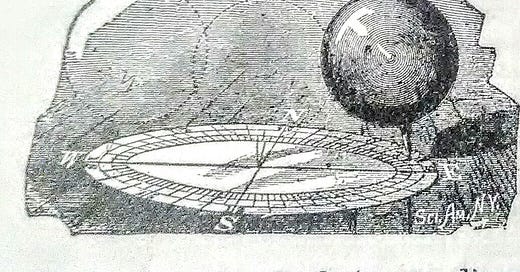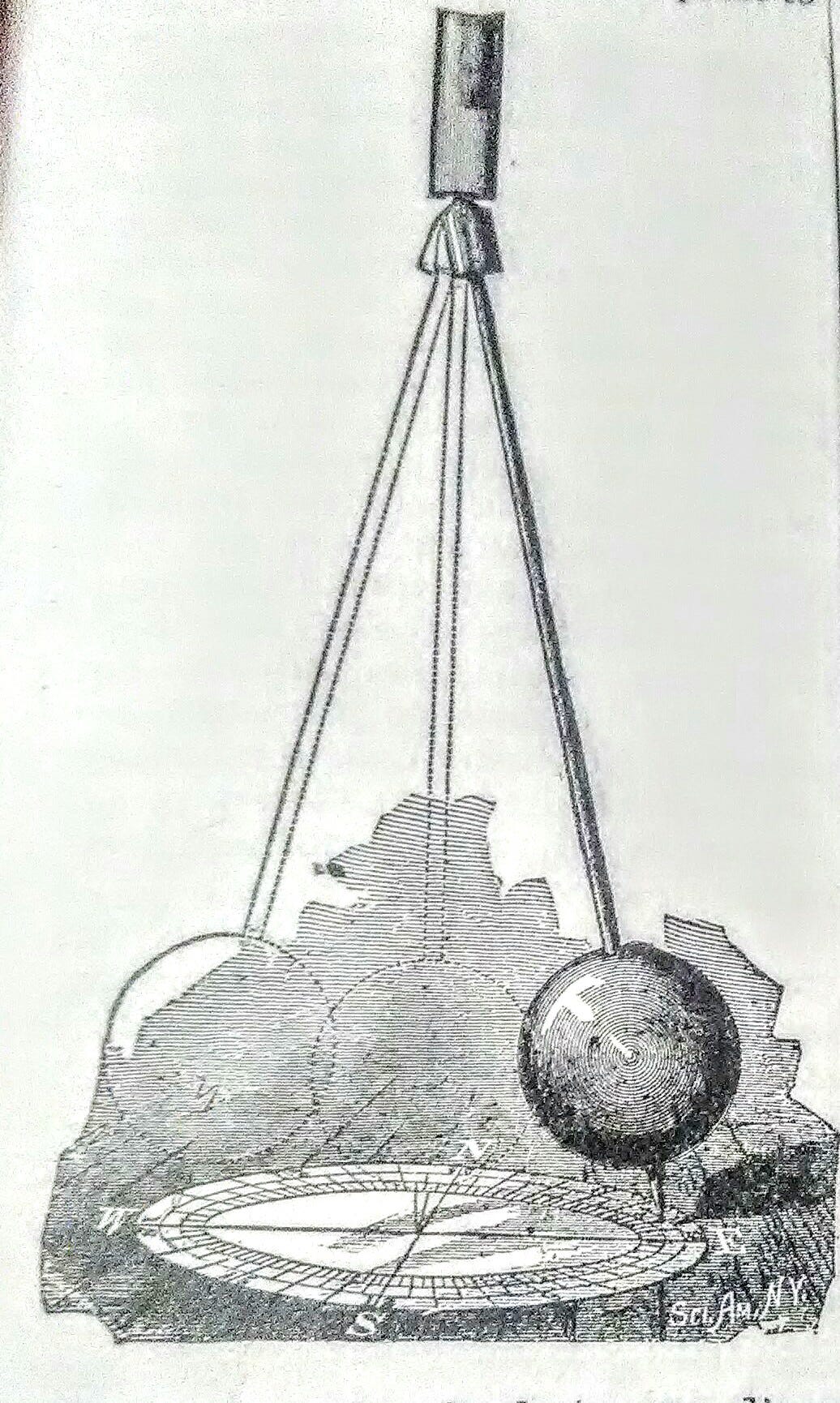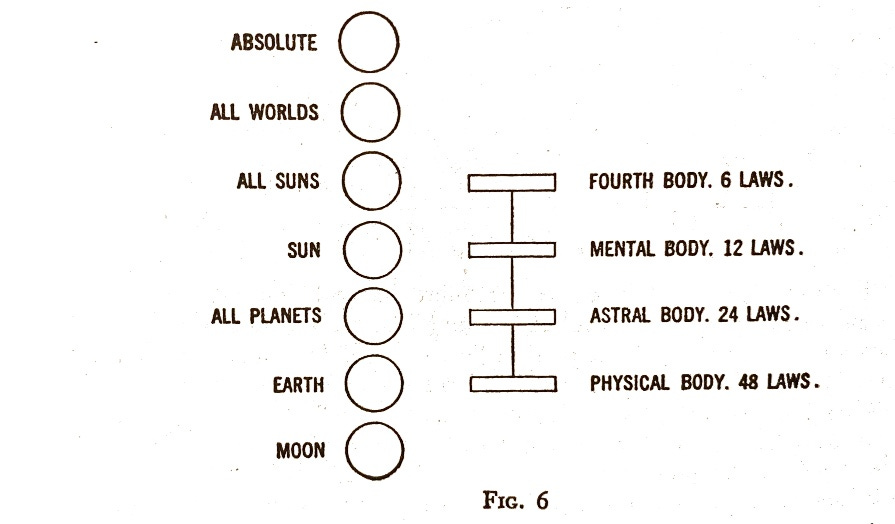This is the eighteenth of our weekly readings in Fragments Reading Club from P.D. Ouspensky’s In Search of the Miraculous, where we are gradually working our way through the whole book. Please post comments and questions.
See this link for the beginning of the book.
(If you are a subscriber to The Journal of Gurdjieff Studies, you can opt in or out of receiving emails from the Fragments Reading Club category.)
Is man immortal or not? What does immortality mean? A man having the fourth body. The story of the seminarist and the omnipotence of God. Talks about the moon. The moon as the weight of a clock. Talk about a universal language. Explanation of the Last Supper.
He again drew the diagram of the ray of creation and by the side of earth he placed the physical body of man.
"This is ordinary man," he said, "man number one, two, three, and four. He has only the physical body. The physical body dies and nothing is left of it. The physical body is composed of earthly material and at
94
death it returns to earth. It is dust and to dust it returns. It is impossible to talk of any kind of 'immortality' for a man of this sort. But if a man has the second body" (he placed the second body on the diagram parallel to the planets), "this second body is composed of material of the planetary world and it can survive the death of the physical body. It is not immortal in the full sense of the word, because after a certain period of time it also dies. But at any rate it does not die with the physical body.
"If a man has the third body" (he placed the third body on the diagram parallel to the sun), "it is composed of material of the sun and it can exist after the death of the 'astral' body.
"The fourth body is composed of material of the starry world, that is, of material that does not belong to the solar system, and therefore, if it has crystallized within the limits of the solar system there is nothing within this system that could destroy it. This means that a man possessing the fourth body is immortal within the limits of the solar system. [Fig. 6.]
"You see, therefore, why it is impossible to answer at once the question: Is man immortal or not? One man is immortal, another is not, a third tries to become immortal, a fourth considers himself immortal and is, therefore, simply a lump of flesh."
When G. went to Moscow our permanent group met without him. There remain in my memory several talks in our group which were connected with what we had recently heard from G. We had many talks about the idea of miracles, and about the fact that the Absolute cannot manifest its will in our world and that this will manifests itself only in the form of mechanical laws and cannot manifest itself by violating these laws.
95
I do not remember which of us was first to remember a well-known, though not very respectful school story, in which we at once saw an illustration of this law.
The story is about an over-aged student of a seminary who, at a final examination, does not understand the idea of God's omnipotence.
'Well, give me an example of something that the Lord cannot do," said the examining bishop.
"It won't take long to do that, your Eminence," answered the seminarist. "Everyone knows that even the Lord himself cannot beat the ace of trumps with the ordinary deuce."
Nothing could be more clear.
There was more sense in this silly story than in a thousand theological treatises. The laws of a game make the essence of the game. A violation of these laws would destroy the entire game. The Absolute can as little interfere in our life and substitute other results in the place of the natural results of causes created by us, or created accidentally, as he can beat the ace of trumps with the deuce. Turgenev wrote somewhere that all ordinary prayers can be reduced to one: "Lord, make it so that twice two be not four." This is the same thing as the ace of trumps of the seminarist.
Another talk was about the moon and its relation to organic life on earth. And again one of our group found a very good example showing the relation of the moon to organic life.
The moon is the weight on a clock. Organic life is the mechanism of the clock brought into motion by the weight. The gravity of the weight, the pull of the chain on the cogwheel, set in motion the wheels and the hands of the clock. If the weight is removed all movements in the mechanism of the clock will at once stop. The moon is a colossal weight hanging on to organic life and thus setting it in motion. Whatever we may be doing, whether it is good or bad, clever or stupid, all the movements of the wheels and the hands of our organism depend upon this weight, which is continually exerting its pressure upon us.
Personally I was very interested in the question of relativity in connection with place, that is, with place in the world. I had long since come to the idea of a relativity dependent upon the interrelation of sizes and velocities. But the idea of place, in the cosmic order, was entirely new both to me and to all the others. How strange it was for me when, some time later, I became convinced that it was the same thing, in other words, that size and velocity determined the place and the place determined size and velocity.
I remember yet another talk that took place during the same period. Someone asked him about the possibility of a universal language—in what connection I do not remember.
96
"A universal language is possible," said G., "only people will never invent it."
"Why not?" asked one of us.
"First because it was invented a long time ago," answered G., "and second because to understand this language and to express ideas in it depends not only upon the knowledge of this language, but also on being. I will say even more. There exists not one, but three universal languages. The first of them can be spoken and written while remaining within the limits of one's own language. The only difference is that when people speak in their ordinary language they do not understand one another, but in this other language they do understand. In the second language, written language is the same for all peoples, like, say, figures or mathematical formulae; but people still speak their own language, yet each of them understands the other even though the other speaks in an unknown language. The third language is the same for all, both the written and the spoken. The difference of language disappears altogether on this level."
"Is not this the same thing which is described in the Acts as the descent of the Holy Ghost upon the Apostles, when they began to understand divers languages?" asked someone.
I noticed that such questions always irritated G.
"I don't know, I wasn't there," he said.
But on other occasions some opportune question led to new and unexpected explanations.
Someone asked him on one occasion during a talk whether there was anything real and leading to some end in the teachings and rites of existing religions.
"Yes and no," said G. "Imagine that we are sitting here talking of religions and that the maid Masha hears our conversation. She, of course, understands it in her own way and she repeats what she has understood to the porter Ivan. The porter Ivan again understands it in his own way and he repeats what he has understood to the coachman Peter next door. The coachman Peter goes to the country and recounts in the village what the gentry talk about in town. Do you think that what he recounts will at all resemble what we said? This is precisely the relation between existing religions and that which was their basis. You get teachings, traditions, prayers, rites, not at fifth but at twenty-fifth hand, and, of course, almost everything has been distorted beyond recognition and everything essential forgotten long ago.
"For instance, in all the denominations of Christianity a great part is played by the tradition of the Last Supper of Christ and his disciples. Liturgies and a whole series of dogmas, rites, and sacraments are based upon it. This has been a ground for schism, for the separation of churches, for the formation of sects; how many people have perished because they
97
would not accept this or that interpretation of it. But, as a matter of fact, nobody understands what this was precisely, or what was done by Christ and his disciples that evening. There exists no explanation that even approximately resembles the truth, because what is written in the Gospels has been, in the first place, much distorted in being copied and translated; and secondly, it was written for those who know. To those who do not know it can explain nothing, but the more they try to understand it, the deeper they are led into error.
"To understand what took place at the Last Supper it is first of all necessary to know certain laws.
"You remember what I said about the 'astral body'? Let us go over it briefly. People who have an 'astral body' can communicate with one another at a distance without having recourse to ordinary physical means. But for such communication to be possible they must establish some 'connection' between them. For this purpose when going to different places or different countries people sometimes take with them something belonging to another, especially things that have been in contact with his body and are permeated with his emanations, and so on. In the same way, in order to maintain a connection with a dead person, his friends used to keep objects which had belonged to him. These things leave, as it were, a trace behind them, something like invisible wires or threads which remain stretched out through space. These threads connect a given object with the person, living or in certain cases dead, to whom the object belonged. Men have known this from the remotest antiquity and have made various uses of this knowledge.
"Traces of it may be found among the customs of many peoples. You know, for instance, that several nations have the custom of blood-brotherhood. Two men, or several men, mix their blood together in the same cup and then drink from this cup. After that they are regarded as brothers by blood. But the origin of this custom lies deeper. In its origin it was a magical ceremony for establishing a connection between 'astral bodies.' Blood has special qualities. And certain peoples, for instance the Jews, ascribed a special significance of magical properties to blood. Now, you see, if a connection between 'astral bodies' had been established, then again according to the beliefs of certain nations it is not broken by death.
"Christ knew that he must die. It had been decided thus beforehand. He knew it and his disciples knew it. And each one knew what part he had to play. But at the same time they wanted to establish a permanent link with Christ. And for this purpose he gave them his blood to drink and his flesh to eat. It was not bread and wine at all, but real flesh and real blood.
"The Last Supper was a magical ceremony similar to 'blood-brotherhood' for establishing a connection between 'astral bodies.' But who is there who knows about this in existing religions and who understands
98
what it means? All this has been long forgotten and everything has been given quite a different meaning. The words have remained but their meaning has long been lost."
This lecture and particularly its ending provoked a great deal of talk in our groups. Many were repelled by what G. said about Christ and the Last Supper; others, on the contrary, felt in this a truth which they never could have reached by themselves.
[End of chapter]




